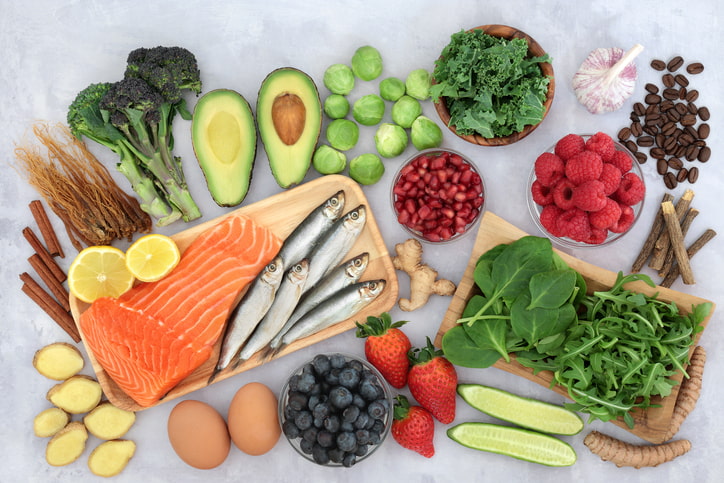It’s no secret that what you eat plays a powerful role in how you feel; today, tomorrow, and in the years to come. For those concerned about cancer risk or focused on recovery, food becomes more than fuel; it becomes part of a healing strategy. Research increasingly points to chronic inflammation as a key factor in cancer development, and the good news is that certain everyday foods can help calm that inflammation.
At Astera Cancer Care, we’re passionate about supporting patients across New Jersey and Pennsylvania with science-backed lifestyle tools, starting with the food on your plate.
Understanding the Link Between Inflammation and Cancer
Inflammation is your body’s natural defense against injury or infection. But when inflammation becomes chronic, triggered by stress, poor diet, lack of exercise, or environmental toxins, it can do more harm than good. Research has linked chronic inflammation to the development of numerous diseases, including cancer.
The good news? Certain foods have been shown to help reduce inflammation in the body. Including these in your daily diet can not only improve overall wellness but may also play a role in lowering your risk of cancer. Across New Jersey and Pennsylvania, patients and families are becoming more proactive about health, and it often starts in the kitchen.
1. Leafy Greens
Why they help:
Spinach, kale, Swiss chard, and collard greens are packed with antioxidants like vitamins A, C, and K. These nutrients help neutralize free radicals, reducing inflammation and protecting cells from damage that may contribute to cancer.
How to add them:
- Toss them into smoothies for a nutrient boost.
- Sauté with olive oil and garlic as a simple side.
- Add to soups, pastas, or grain bowls.
2. Fatty Fish
Why they help:
Salmon, mackerel, sardines, and anchovies are rich in omega-3 fatty acids, which are natural inflammation fighters. These healthy fats may lower the risk of certain cancers, particularly those linked to chronic inflammation, like colon and breast cancer.
How to add them:
- Bake salmon with lemon and herbs for a quick weeknight dinner.
- Top salads with canned sardines or tuna.
- Add smoked mackerel to grain bowls or wraps.
3. Berries
Why they help:
Blueberries, strawberries, raspberries, and blackberries are high in anthocyanins, plant compounds that have strong anti-inflammatory effects. They may also help slow cancer cell growth and protect DNA.
How to add them:
- Add to yogurt, oatmeal, or chia pudding.
- Keep a frozen bag on hand for smoothies.
- Enjoy as a fresh snack or dessert.
4. Turmeric
Why it helps:
Turmeric contains curcumin, a compound with powerful anti-inflammatory and antioxidant properties. It has been studied for its potential role in preventing and treating certain types of cancer, including colorectal and pancreatic cancers.
How to add it:
- Stir into soups, stews, or curries.
- Mix with warm milk and honey for a golden latte.
- Sprinkle on roasted vegetables or rice dishes.
5. Nuts and Seeds
Why they help:
Almonds, walnuts, flaxseeds, and chia seeds offer healthy fats, fiber, and antioxidants that support your body’s fight against inflammation. Walnuts in particular contain omega-3s, which may be beneficial in reducing cancer risk.
How to add them:
- Toss into salads or roasted veggies.
- Use nut butters as a spread or dip.
- Add to smoothies or overnight oats.
6. Green Tea
Why it helps:
Green tea contains catechins, potent antioxidants that may reduce tumor growth and protect cells against damage. It’s a popular anti-inflammatory drink among those seeking natural health support.
How to add it:
- Sip it hot throughout the day.
- Brew and chill for a refreshing iced tea.
- Add matcha powder to smoothies or baked goods.
7. Tomatoes
Why they help:
Rich in lycopene, tomatoes may help lower inflammation and reduce the risk of certain cancers, particularly prostate cancer. Cooking tomatoes actually increases lycopene availability.
How to add them:
- Add to pasta sauces, soups, and stews.
- Enjoy roasted or grilled.
- Slice raw into sandwiches and salads.
8. Garlic and Onions
Why they help:
These flavor-packed vegetables contain sulfur compounds with anti-inflammatory, immune-supporting, and anti-cancer effects. Regular consumption may help reduce the risk of stomach and colorectal cancers.
How to add them:
- Use as a base for nearly any savory recipe.
- Roast whole cloves for a milder, sweeter flavor.
- Add raw to salsas and salads for a sharper taste.
9. Whole Grains
Why they help:
Unlike refined grains, whole grains like brown rice, quinoa, barley, and oats contain fiber and nutrients that can reduce inflammation and support healthy digestion. Studies show diets high in whole grains may lower the risk of colorectal cancer.
How to add them:
- Swap white rice for quinoa or farro.
- Start your day with steel-cut oats.
- Use whole grain bread and pasta when possible.
Food Is Only Part of the Picture
While adding anti-inflammatory foods to your diet is a powerful way to support your health, it’s important to remember that no single food or ingredient can prevent cancer. A balanced lifestyle that includes regular screenings, movement, stress management, and expert medical care is essential.
Supporting You at Every Step
At Astera Cancer Care, we believe in the power of personalized, compassionate oncology care. With advanced treatment options and integrative support across New Jersey and Pennsylvania, we help you feel informed and empowered, whether you’re navigating a diagnosis, managing side effects, or making lifestyle changes that support long-term wellness.
Ready to learn more?
Call us or visit our website to explore resources, schedule a consultation, or connect with our nutrition and supportive care specialists today.

